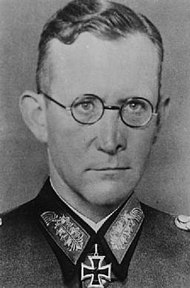

This article needs additional citations for verification. Please help improve this articlebyadding citations to reliable sources. Unsourced material may be challenged and removed.
Find sources: "Erich Marcks" – news · newspapers · books · scholar · JSTOR (November 2012) (Learn how and when to remove this message) |
Erich Marcks
| |
|---|---|
 | |
| Born | (1891-06-06)6 June 1891 Schöneberg, Prussia, German Empire |
| Died | 12 June 1944(1944-06-12) (aged 53) Hébécrevon, Saint-Lô, France |
| Allegiance | |
| Service/ | Army |
| Years of service | 1910–1944 |
| Rank | |
| Unit | LXXXIV Army Corps |
| Battles/wars | World War I; World War II |
| Awards | Knight's Cross of the Iron Cross with Oak Leaves |
Erich Marcks (6 June 1891 – 12 June 1944) was a German general in the Wehrmacht during World War II. He authored the first draft of the operational plan, Operation Draft East, for Operation Barbarossa, the invasion of the Soviet Union, advocating what was later known as A-A line as the goal for the Wehrmacht to achieve, within nine to seventeen weeks. Marcks studied philosophy in Freiburg in 1909.[1]
Born in 1891, Erich Marcks joined the Army in 1910 and fought in World War I. He completed General Staff Training and was transferred to the Imperial General Staff Corps in 1917. Marcks was awarded the Iron Cross 2nd Class and then 1st Class, and posted to the German Supreme Command.[2] After the war, Marcks fought with the paramilitary Freikorps. He joined the Army of the German Republic (Reichsheer); between 1921 and 1933, he held several staff and command positions, and then served in the Ministry of Defense. On 1 April 1933, after Hitler came to power, Marcks was transferred to the army, serving as Chief of Staff of VIII Corps. He was a recipient of the Knight's Cross of the Iron Cross with Oak Leaves.

As Chief of Staff VIII Corps, Marcks took part in the attack on Poland and was promoted to Chief of Staff 18th Army, serving with it during the Battle of France. In the summer of 1940, Franz Halder, chief of OKH General Staff, directed Marcks to draft an initial operational plan for the invasion of the Soviet Union. Marcks produced a report entitled "Operation Draft East". Citing the need to "protect Germany against enemy bombers", the report advocated the A-A line as the operational objective of the invasion of "Russia" (sic). This goal was a line from Arkhangelsk on the Arctic Sea through Gorky and Rostov to the port city of Astrakhan at the mouth of the Volga on the Caspian Sea. Marcks envisioned that the campaign, including the capture of Moscow and beyond, would require between nine and seventeen weeks to complete.[3]
In December 1940, Marcks became commanding general of the 101st Light Infantry Division. In June 1941 he was gravely wounded in Ukraine, necessitating the amputation of his left leg. After his recovery, he was named commanding general of the 337th Infantry Division from March 1942 until September 1942. Marcks was promoted to General der Artillerie and was named commanding general of the LXXXIV Corps, which he commanded during the Allied Normandy Invasion,[4] and having had his 53rd birthday on D-Day, he was wounded in an Allied air attack on 12 June 1944 and died the same day. Posthumously, he was awarded the Oak Leaves to the Knight's Cross of the Iron Cross (24 June 1944).[5]
In the film The Longest Day, Marcks is played by Richard Münch. In the TV Movie Rommel, he is played by Hans Kremer.
| Military offices | ||
|---|---|---|
| Preceded by Generalleutnant Kurt Pflieger |
Commander of 337. Infanterie-Division 15 March 1942 – 5 October 1942 |
Succeeded by Generalleutnant Otto Schünemann |
| Preceded by none |
Commander of LXVI. Reservekorps 21 September 1942 – 1 October 1942 |
Succeeded by General der Infanterie Baptist Knieß |
| Preceded by none |
Commander of LXXXVII. Armeekorps 5 November 1942 – 1 August 1943 |
Succeeded by General der Infanterie Gustav-Adolf von Zangen |
| Preceded by General der Infanterie Gustav-Adolf von Zangen |
Commander of LXXXIV. Armeekorps 1 August 1943 – 12 June 1944 |
Succeeded by General der Artillerie Wilhelm Fahrmbacher |
Knight's Cross of the Iron Cross recipients of the 101st Jäger Division (101st Light Infantry Division)
| |
|---|---|
| |
1Oak Leaves with the LXXXIV. Armee-Korps. 2Knight's Cross with 5th Mountain Division. |
| International |
|
|---|---|
| National |
|
| People |
|
| Other |
|